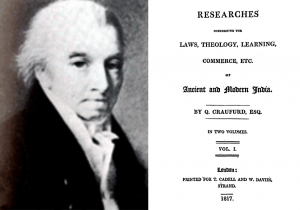The following excerpts are from Quintin Craufurd’s book called ‘Researches concerning the law, theology, learning, commerce, etc. of ancient and modern India.’ published in 1817. In one of the chapters he writes about the Sikhs, their history, faith, and practices.
He (A Sikh) is told to be civil to all with whom he converses, to endeavour to attain wisdom, and to emulate the persuasive eloquence of Bana Nanac. He is particularly enjoined, whenever he approaches any of the Sikh temples, to do it with reverence, and to go to Amritsar to pay his devotions there, and offer up his vows for the Khalsa, or state, interests of which he is directed, on all occasions, to consider paramount to his own. He is directed to labour to increase the prosperity of the town of Amritsar; and is further told, that at every place of worship which he visits, he will be conducted in the right path by the Guru (Guru Govind). He is instructed to believe, that it is the duty of all those who belong to the Khalsa, or commonwealth of the Sikhs, neither to lament the sacrifice of property, nor of life, in support of each other; and he is commanded to read the Adi Granth and Dasama Padshah ka Granth, every morning and evening. Whatever he has received from God, he is told it is his duty to share with others; and after the disciple has heard and promised to observe all these and other precepts, he is declared to be duly initiated. By the religious institutions of Guru Govind, proselytes are admitted from all tribes and casts in the universe. The initiation may take place at any time of life, but the children of the Singhs all go through this rite at a very early age.
(Page 364)
…..But the Dasama Padshah-ka-Granth, or book of the tenth chief, composed by Guru Govind, is held in as much veneration as the Adi Granth.
(Page 349)
But the sacred book of Guru Govind is not confined to religious subjects; it abounds with accounts of his battles, and of actions performed by the most valiant of his followers. . Throughout the work, courage is not only highly extolled, but is considered as an indispensable virtue; and he declares to his followers, that dying in defence of their faith will not only procure the greatest glory that can be obtained in this life, but happiness in a future state. A Sikh author, speaking of Guru Govind and his doctrines, says:
“By the command of the Eternal, the great Guru disseminated the true knowledge. Full of strength and courage, he successfully established the Khalsa. Thus, at once founding the Singhs, he struck the whole world with awe; overturning temples, tombs, and mosques, he levelled them all with the plain; rejecting the Vedas, the Puranas, the six Sastras, and the Koran, he abolished the cry of Namaz, and slew the Sultans; reducing the Mirs and Pirsf to silence, he overturned all their sects; the Moullahs and the Kazis were confounded, and found no benefit from their studies. The Brahmins, the Pandits, and the Jotishis had acquired a relish for worldly things; they worshipped stones and temples, and forgot the Supreme. Thus these two sects, the Mohammedan and Hindu, remained involved in delusion and ignorance, when the Khalsa originated in purity. When, at the order of Guru Govind, the Singhs seized and displayed the scymitar, then subduing all their enemies, they meditated on the Eternal; and, as soon as the order of the Most High was manifested in the world, circumcision ceased, and the Moslems trembled when they saw the ritual of Mohammed destroyed: then the Na- kara* of victory sounded throughout the world, and fear and dread were abolished.
(Page 350-351)
Quintin Craufurd (22 September 1743 – 23 November 1819) was a British author born at Kilwinning, Scotland. He went to India, where he entered the service of the British East India Company. Returning to Europe he settled in Paris, where he gave himself to the cultivation of literature and art, and formed a good library and collection of paintings, coins and other objects of antiquarian interest.


Leave a Reply